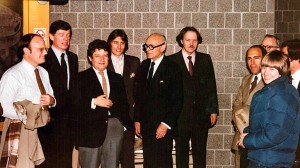
During his acceptance speech at the Driehaus Prize ceremony in Chicago a couple of weeks ago, laureate Thomas Beeby made an interesting point: architecture is turning into an uncollegial profession. Of course, architecture has always been highly competitive. Building is a zero-sum game, that is, only a limited number of commissions are available at any one time, so if one architect gets to build, another doesn’t. Established, experienced practitioners have always had the inside track and access to the best jobs and the best clients; novices get whatever’s left over. But Beeby was making a slightly different point. Despite the competitive nature of the profession, there have been always been periods when architects have banded together. One thinks of the Beaux-Arts-trained group who came together to create the World’s Columbian Exposition in Chicago, and the McMillan Plan in Washington, D.C. Or the early modernists who formed Der Ring in Berlin in the 1920s and later CIAM, and the young firebrands who founded Team Ten in the 1950s. Beeby himself was part of a group called the Chicago Seven in the 1970s, a Midwestern equivalent to the Greys and the Whites of the East Coast. That sort of collegiality is rare today, he observed. In a period of signature styles, architectural celebrity, intense self-promotion, and design-as-biography, it is every man and woman for themselves.

I’m missing Beeby’s intent with the term “uncollegial.” I have been in the profession 18 years which has included involvement within the AIA; those experiences are best explained as a collegial (or chummy). That professional comradely has only reinforced and benefitted my practice. I see similar benefit to other organizations like CSI.
It appears his concern is about one coherent style, or lack thereof. More so, that the profession lacks a coherent design direction. We may not agree on style, and therefore practice our own individual cannon, but that is wholly separate from our professional engagement with one another. I’d rather it not be the other way around.
I’m not sure that Tom actually used the word collegial, but I’m pretty sure that he wasn’t referring to architects having different styles, but to the lack of dialogue. Recent exchange between Krier and Eisenman in Architect magazine is rather the exception.